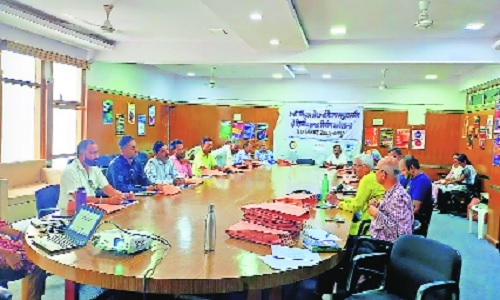Good response to workshop on TPP, coal issues
14 Sep 2023 10:48:22

Staff Reporter
A two-day community level capacity building workshop on ‘Thermal Power Plant (TPP), Coal Issues and Energy Landscape’ was held at MLA Hostel, Civil Lines, recently. Around 40 persons from thermal power plant affected communities of Madhya Pradesh and Maharashtra participated in the workshop. The workshop was jointly organised by Centre for Financial Accountability (CFA), New Delhi; Centre for Sustainable Development (CFSD), Nagpur; and Bargi Dam Displaced and Affected Association. The aim of the workshop was to discuss the emerging trends in the energy landscape and to emphasise the importance of just and equitable energy transition. Also to enable a platform where affected communities can put forward their concerns. Anitha Sampath of CFA talked about the detrimental effects on the environment, health and climate while also elaborating on the advantages and disadvantages of renewable sources of energy. India’s fossil fuel reserves are limited. Known reserves of oil and natural gas can last up to 18 and 26 years, respectively, depending on current reserves and production rates.
India has huge coal reserves (84 billion tonnes) which can last for about 200 years. Increasing ash content of Indian coal from an increasing number of thermal power plants as well as associated greenhouse gas emissions are major concerns, she added. Rajkumar Sinha from the Bargi Dam Displaced and Affected Association, spoke on the energy landscape of Madhya Pradesh the contribution of various sources of regionally concentrated energy, and the demand and availability of energy and increasing power consumption by private companies. Leena Buddhe of CFSD explained how to measure and monitor the impact of large energy projects on the environment, water pollution and health and also how to use this data in people’s struggles.
Amitanshu Verma, senior researcher, CFA, shed light on institutions providing energy finance. He said, “Banks financing energy projects are becoming socially and environmentally responsible. Loans should not be given to projects which cause displacement, health and environmental impacts.” Jammu Anand, a social activist highlighted the energy consumption scenario in urban areas. Around 40 people from the communities and organisations affected by Madhya Pradesh’s Jhabua Thermal Power Plant, Gadarwara Thermal Power Plant, Chutka Nuclear Project, Today Energy and Maharashtra’s Koradi Thermal Power Plant, Khapadkheda Thermal Power Plant, Chandrapur Thermal Power Plant and Mauda Thermal Power Plant, participated in the workshop.